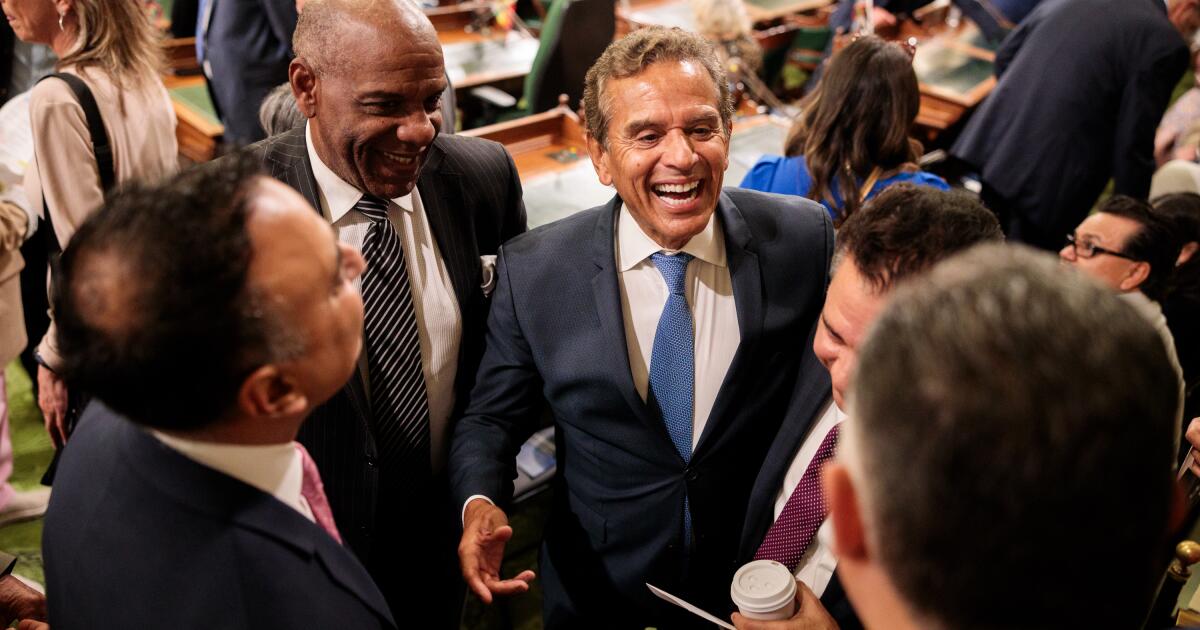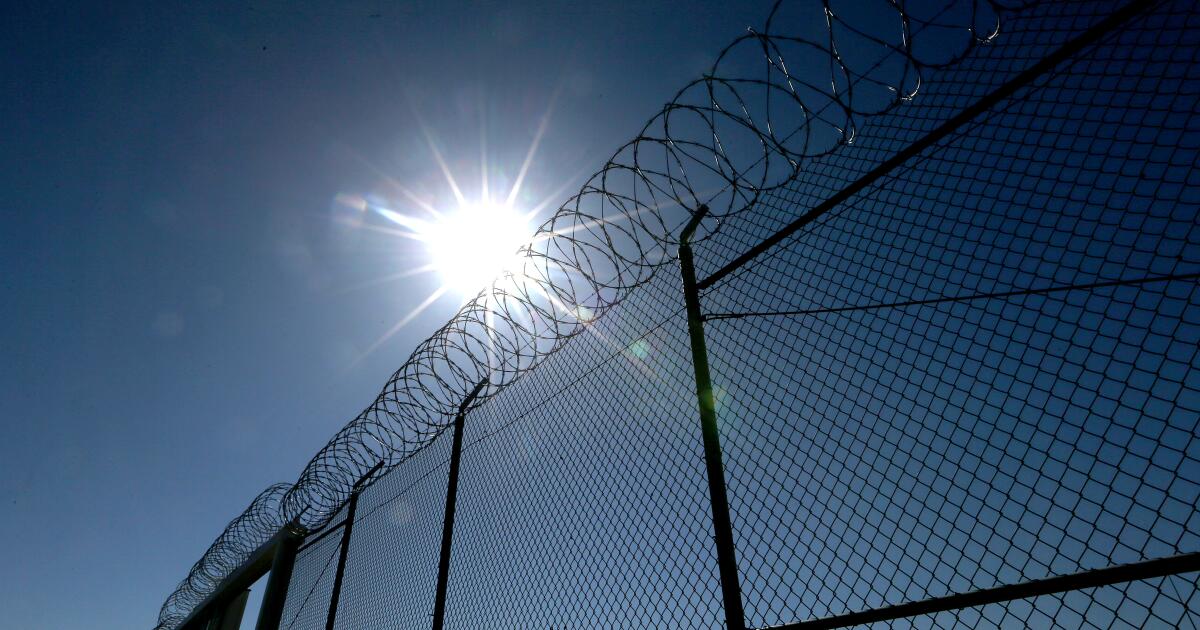Lifestyle
Death doula says life is more meaningful if you 'get real' about the end

In Alua Arthur’s 2023 TED Talk, she said her ideal death would happen at sunset.
Yeofi Andoh/HarperCollins
hide caption
toggle caption
Yeofi Andoh/HarperCollins

In Alua Arthur’s 2023 TED Talk, she said her ideal death would happen at sunset.
Yeofi Andoh/HarperCollins
As a death doula, Alua Arthur helps people to plan for the end of life and, when the time comes, to let go. She says that while we’re conditioned to fear death, thinking and talking about it is instrumental to creating meaningful lives.
“When I’m thinking about my death, I’m thinking about my life very clearly: … What I value, who I care about, how I’m spending my time,” Arthur says. “And all these things allow us to reach the end of our lives gracefully, so that we can die without the fear and the concerns and the worries that many people carry.”
Before becoming a death doula, Arthur worked as attorney — a job she hated. Unhappy and depressed, she took a trip to Cuba where she met a fellow traveler who had terminal uterine cancer. Talking to the woman about death, Arthur realized she needed to make a change.

“Up until then, I was just kind of waiting for my life to write itself without taking any action to make it so,” she says. “Thinking about my mortality, about my death, really created action.”
Arthur went on to found Going with Grace, an organization that supports people as they plan for the end of their lives. She says a big part of her work is helping people deal with regret as they reconcile the lives they lived with the lives they might have wanted.

“When folks are grappling with the choices that they’ve made, my role is to be there with them,” she says. “Sometimes the greatest gift that we can offer is grace. … Part of the reason why I named the business ‘Going with Grace’ is because of the grace that needs to be present at the end of life, for people to be able to let go of it.”
Arthur’s new book is Briefly Perfectly Human: Making an Authentic Life by Getting Real About the End.
Interview highlights


On the death of her brother in law, Peter, in 2013
It was the first time I was really faced with this reality that the people that we love might not be here for much longer. It felt really isolating. I knew intellectually that there were a lot of other people that were ill and getting close to … the end of their lives, but it felt like we were the only ones that felt like we were on this little cancer planet by ourselves, where somebody we loved will soon be dying. And there wasn’t some one person that I could turn to to say, “Help! Just help. I’m lost here,” or “Today’s really hard,” or “How do we navigate this?” Or “What do we do with all these medications?” “Where can we find smaller sized hospital gowns that will arrive, like in the next days?” (Because he was losing weight so rapidly) We just needed some help and I mean, practically, but also just somebody to be there to listen, to rely upon, somebody that I could lean on as other people were leaning on me. …
Many people have already served as death doulas for somebody in their family, and most of us will at some point. Which is why I think it’s so important that we all have a functional death literacy, because we live in community. We die in community. At some point, a member of that community is going to need the support. So many of us are going to do it and already have. That’s how I learned how to do it is through Peter. I took courses afterwards, but that was the initial spark, the initial practical application of the work itself.
On facing grief

The thing about grief is whether or not you want to face it, it’s going to find its way through. Either we don’t acknowledge it emotionally, and it manifests itself in work, or our relationships, or addiction or some other traumatic event, or it shows up in our bodies as illness. But grief is present. Grief lives in the body and it must be accessed at some point. It will force its way. I think that since we push so many of our sad or difficult emotions away, we don’t allow space for grief because it is difficult. But I don’t yet know anybody who has died from grieving. It’s hard, and yet there is always another day, provided we choose the next day.
On the importance of talking to your medical proxy

The first thing I encourage people to do is to think about the person who will make the decisions for them in the event that they can’t. That is a health care proxy or a medical power of attorney, or just somebody whose job it is to make your decisions. Somebody who would make decisions the way that you would. Not the way that they would, not the things that they want for you, but rather what you would want for yourself. And to begin communicating those desires to your health care proxy, because the communication of that desire is going to open up a beautiful, rich conversation about what you want with your life, how you want your life to eventually end, if that is the way that it’s going, and then get you started on the path toward planning for it.
On how not talking about death openly leads to fear and anxiety

I think a lot of the old way of thinking is largely responsible for the death phobia that we currently experience in today’s culture and society … where we pretend it’s not happening, where bodies are whisked away to funeral homes just moments after the death has occurred. We don’t take time with the body. We don’t take time to talk about death. We pretend it’s not happening until it’s too late. That death phobia has caused a real crisis, I think, in this country and in the West overall, where we are living out of relationship with nature and with our mortality, which is ultimately a detriment to us as a culture, but also to us as individuals.
On helping people who are at their worst
People are most human when they are dying. They are at their fullest. That means their best and their worst. I think as people are approaching the end, they are grieving as well. They are grieving their own death. They are grieving all the things that they’re going to leave. I think we often forget that when somebody in our lives is dying, we are losing them, but they are losing everything and everyone and leaving the only place that they’ve known consciously. And so that brings about a lot of emotion, and some of it is anger and frustration. And sometimes disease causes personality changes. Sometimes there is some vitriol and sometimes it’s just really not pretty. … If we can be present for their experience, which often is rooted in fear, then I think it allows us to not take it so personally and to give them some grace for what it is that they are experiencing.
On advice for caregivers

Give yourself plenty of grace. You, I’m sure, are doing amazing because this is really, really hard. … I wish somebody had said that to me at various points. … Next, I’d also encourage that people try to take a minute to check in with their bodies and take care of their bodies’ needs. Make sure that you’re eating to the best that you can … find pockets of rest where you can. To the extent that you can, speak your needs and let somebody else support you in it. If you have a need, no matter how small it might be, speak it and open the space for somebody to support you in it. And I’d also say reach out for some support if you can, not only to a friend … but there are plenty of doulas that are willing to support their community members at a free or reduced cost, maybe even a sliding scale. Reach out. There are plenty of resources that are available, but most importantly, if you hear nothing else, please just give yourself some grace for the process. It’s tough.
On advice for the moment you sit with a loved one during their death

Do your best to stay present. Do your best to stay in your body. It can be so confronting that the desire, the urge to disassociate or to distract is huge. And yet, if there’s somebody that you loved and cared for, if you could hold thoughts of love and care and honor and gratitude for their lives, that’s a really beautiful way to be during that time. And also, as always, give yourself plenty of grace for however it is that you’re approaching it. If there is somebody in the room that is having a bigger emotional reaction, ask for their consent before touching or interrupting it or being with it in any way. And not everybody who is crying wants the tears to stop, or needs a tissue to plug them up, or wants a hug. Maybe they want to stay present in their bodies without the imposition as well. … It’s utterly profound. Getting to witness the doorway to existence is a gift and a privilege and a huge honor. And so hopefully we can continue to treat it as such.
Sam Briger and Thea Chaloner produced and edited this interview for broadcast. Bridget Bentz, Molly Seavy-Nesper and Beth Novey adapted it for the web.


Lifestyle
Can straight married men and women be friends? I went on a quest to find out

Last fall I met a guy.
He had a thick mustache and was, by my estimate, at least 10 years my junior. We happened to sit next to each other at a dinner event at my social club. I’d recently watched “Wild Wild Country,” a documentary series on a religious cult, and it was all I wanted to talk about. It turned out that he loved documentaries on religious cults too. Soon he was listing others I needed to see. We ended up discussing movies, Buddhism and his home state of Vermont for most of the night. He was funny, enthusiastic, friendly and smart. I felt lucky to have met him.
When the event wrapped up I thought about asking for his number — maybe we could get a drink sometime? But I decided against it. If he’d been a woman or gay I wouldn’t have hesitated, but we are both in committed heterosexual relationships. I in a fulfilling marriage with my awesome husband, he in what seemed like a happy relationship with his girlfriend. I didn’t want to date him, I just wanted to hang out again. But for two people in our situation, is pursuing an independent friendship even allowed?
I’ve always thought of myself as someone who seeks out male and female friends equally, but now that I’m a married mother in my 40s it seems this is no longer the case. In the last decade I’ve befriended hetero and queer women, gay men and non-binary folks. But with a few caveats, I haven’t developed new friendships with straight guys. Had I unconsciously accepted the old adage from “When Harry Met Sally” that men and women can’t be friends because “the sex part always gets in the way”?
After my encounter with the fellow religious cult documentary fan, I began to wonder how I got here and if I was the only married woman who felt this way. Was this evidence of my age, or an instinct that spanned generations? Surely our understanding of relationships has evolved since Meg Ryan faked an orgasm in Katz’s Deli.
After talking with friends and strangers, therapists and a few professors, I’ve found that the answers to my questions vary wildly, depending on who you ask. And also: there is far more at play within platonic relationships than I’d ever thought.
“It’s different for everyone,” said Gaea Woods, a marriage and family therapist who practices in Los Feliz. “It’s up to you to decide based on the relationship if it’s appropriate or not.”
Despite the impact that social connection has on our well-being, research on adult friendships is scant, and even harder to come by when considering friendships between men and women.
“We focused so long on romantic relationships to the exclusion of other relationships that we simply don’t have basic data,” said Jaimie Krems, a social psychologist at UCLA and director of the university’s new Center for Friendship Research.
The few studies that do exist tend to look at male and female friends in their late teens and early 20s when researchers say opposite sex friendships are more common. But in my quest for answers, I did manage to find a study from 2012 published in the Journal of Social and Personal Relationship that included a survey of older adults in their 30s and 40s who were asked to list the benefits and challenges of having a friend of the opposite sex.
Overall, people in the study reported more pros than cons. They valued the conversation, emotional support, advice and especially the insights into how members of another gender think, but they also acknowledged significant challenges. Chief among them were navigating the jealousy of a romantic partner and the possibility that the friendship could lead to romantic feelings.
I know from my own life experience that these hurdles can be overcome. I’ve had several platonic male friendships over the years and they’ve never veered into dicey territory. My husband is also remarkably OK with these relationships and has female friends of his own. (Though, speaking with friends and acquaintances, I know this isn’t true for everyone). Even so, my current straight male pals are either friends from my youth or people I’ve met through work. Forging new platonic relationships with straight men outside of these categories feels more fraught.
When I told Krems about my discomfort, she suggested it may be because I’m uncertain about how my overtures of friendship will be received by straight men who I’ve just met. It’s less complicated with old friends, she explained, because those friendships are clearly defined as platonic.
“That relationship has a script already,” she said. “You know what it is and you aren’t negotiating what it could be.”
The same is often true for work friends.
“You have this very tight, well worn schema that we are adult colleagues who are going out to talk,” she said.
But with a new friend of a different sex, the parameters of the relationship have not yet been established. If I suggest going out for a drink, a guy who doesn’t know much about me yet might assume my intentions are romantic. Or even worse, his wife or girlfriend might.
“You don’t know what the great benefits are going to be of the friendship — maybe you guys have chemistry and can be best friends, but immediately the road blocks are apparent,” Krems said.
When I held an informal poll of women in my community, some said they have deliberately eliminated friendships with straight men from their lives.
Anja Ahkile, a doula and mother of three young girls who lives in Beverlywood said most of her romantic relationships started as friendships — including her relationship with her husband. (They were in the friend zone for a year before they got together.) Because of that she’s developed strict boundaries around her interactions with men. When she and her husband go out with another hetero couple she’ll shake the male partner’s hand rather than offering a hug, and she’s always careful to greet the woman first. She’s also told her husband she’s not comfortable with him developing close friendships with women.
“I could be friends with someone of the opposite sex, but what happens when me and my husband are in a rough patch and there’s this other dude who is easy going and we have a bond?” she said. “There is too much potential and fertile soil for the lines to get blurred.”
Akhile says she loves her husband, but she also acknowledges that there are other men in the world who she could have fun with. Falling for one of them is a risk she doesn’t want to take.
“I don’t want to ruin my marriage, especially when overall I’m happy in my marriage,” she said.
Like Akhile, I’m in a fulfilling marriage and certainly don’t want to risk messing it up. But is total abstinence from male friendship really necessary? The friendship researchers I spoke to say they don’t yet have enough data to draw conclusions.
“We know that most friendships across cultures and across eras have really been within sex, making mixed sex friendships a little less normative,” Krems said.
There is also some evidence that opposite sex relationships become more challenging as we age. April Bleske-Rechek, a psychology professor at the University of Wisconsin-Eau Claire and lead author of the 2012 study that looked at the pros and cons of opposite sex friendships said there is a difference between the dynamics of having a friend of another sex in early adulthood, when we are more likely to be seeking a romantic partner, and later in life when we are more likely to be in partnerships we don’t want to jeopardize.
“As people get older they are more likely to settle down with somebody and more likely to have kids, so the nature of their friendships changes,” Bleske-Rechek said. “Women in particular tend to make mom friends, and it’s just safer to go out with other couples.”
But then there’s Kendra Schussel, an environmental consultant in Burbank, and one of the few women I talked to who had developed an independent friendship with a straight married guy while in her 40s.
They started chatting while picking their kids up from an after school theater program and hit it off. The kids liked each other and the guy wasn’t working at the time, so he was able to do all the extra-curricular activities that his partner couldn’t. Over time they discovered that they both liked raunchy fart jokes and whiskey. Soon they were texting regularly. When Schussel started dating again after her divorce she talked to him about the men she was going out with. Eventually, Schussel became good friends with his wife, too.
“She never indicated to me directly or indirectly that it was a problem for her and she’s a therapist so I think she would have said something,” Schussel said. “I realize this is wildly unusual and I’m so grateful for this friendship.”
Schussel is proof that hetero opposite sex relationships are possible, but she has boundaries too. She’s touchy-feely with her female friends — linking arms, sitting close — but she doesn’t do that with her married male friends. She’s also promised herself that if she thinks she might want more from a friendship with a married man she has to end it.
“I trust myself,” she said. “I would never want to be the person who broke up a marriage or got in the way of someone else’s relationship.”
As for me, I’ve decided that while I really liked my dinner companion from the other night, I’m not going to pursue an independent friendship with him. Like Schussel, I’m confident I can keep the friendship platonic, but I don’t want to make him feel awkward by asking for his number, and I certainly don’t want to make his girlfriend suspicious that I have ulterior motives, especially when I liked her so much too.
Maybe if he and I had met in college or at a work event we would be great friends. But for now, I’ll just enjoy seeing him — and his girlfriend — together at my local social club.
She likes religious documentaries too.
Lifestyle
Gérard Depardieu will be tried for alleged sexual assaults on a film set

Actor Gerard Depardieu addresses the media during the press conference for the film ‘Saint Amour’ at the 2016 Berlinale Film Festival in Berlin, Germany, Friday, Feb. 19, 2016.
Axel Schmidt/AP
hide caption
toggle caption
Axel Schmidt/AP

Actor Gerard Depardieu addresses the media during the press conference for the film ‘Saint Amour’ at the 2016 Berlinale Film Festival in Berlin, Germany, Friday, Feb. 19, 2016.
Axel Schmidt/AP
PARIS — French actor Gérard Depardieu will face a criminal trial in October over the alleged sexual assaults in 2021 of two women on the set of a film, prosecutors announced Monday.
The 75-year-old actor, who previously has denied any wrongdoing, was detained for questioning by police in Paris for several hours earlier Monday. His lawyer, Christian Saint-Palais, later declined to comment to reporters other than to say that the actor was no longer in custody.
The Paris public prosecutor’s office said in a statement that the actor has been “summoned to appear before the criminal court” after the questioning.

Reporters wait outside the police station where French actor Gerard Depardieu is being questioned, Monday, April 29, 2024 in Paris.
Michel Euler/AP
hide caption
toggle caption
Michel Euler/AP

Reporters wait outside the police station where French actor Gerard Depardieu is being questioned, Monday, April 29, 2024 in Paris.
Michel Euler/AP
A trial will start in October “for sexual assaults likely to have been committed in September 2021” against “two victims, on the set of the film ‘The Green Shutters,’ ” the statement said. It did not name the alleged victims.
French newspaper Le Parisien has reported that a 53-year-old movie decorator has alleged that Depardieu grabbed her and kneaded her waist, stomach and breasts during filming for “Les Volets verts,” or “The Green Shutters,” according to the woman’s lawyer, Carine Durrieu Diebolt, when she filed the complaint to the Paris prosecutor’s office in February.
In an open letter last October, Depardieu said: “I have never, ever abused a woman.”
Depardieu has also been accused by more than a dozen other women of harassing, groping or sexually assaulting them. He was handed preliminary rape and sexual assault charges in 2020 following allegations from actor Charlotte Arnould.
In that case, the investigating judge completed his probe on April 17 and transferred the file to the Paris public prosecutor’s office “to review and determine next steps in the proceeding,” the prosecutor’s office said Monday.
Depardieu was long seen as a national icon in France. He has been a global ambassador for French film and enjoyed international fame with several roles in Hollywood.
The latest episode involving Depardieu came as French cinema is roiled by a #metoo awakening following actor Judith Godrèche’s call for France’s film industry to “face the truth” on sexual violence and physical abuse. She made that appeal during a live broadcast in February of the Cesar Awards ceremony, France’s version of the Oscars.
Lifestyle
Brian Cox Says the Bible Is the Worst Book Ever, Slams Organized Religion
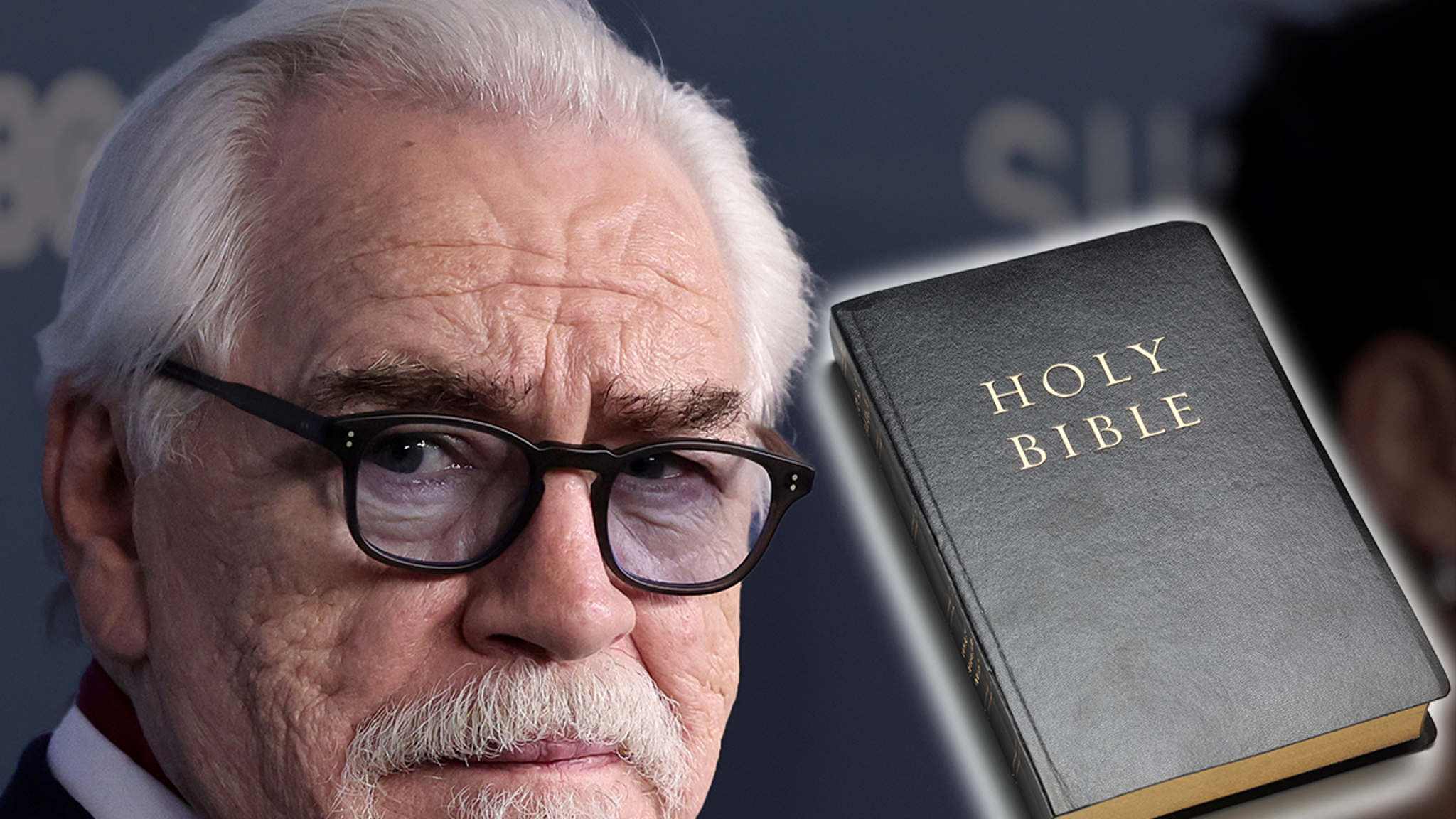
Brian Cox is crapping on organized religion, and especially Christianity … calling the Bible the worst book to ever grace human history, ’cause it’s duped so many suckers and fools.
The “Succession” star sat for an interview with ‘The Starting Line Podcast‘ … and they talked about a lot of stuff — including introspective thoughts on religion, God, spirituality, and all the rest. From Brian’s POV … it’s all a bunch of hogwash, not buying any of it.
The Starting Line Podcast
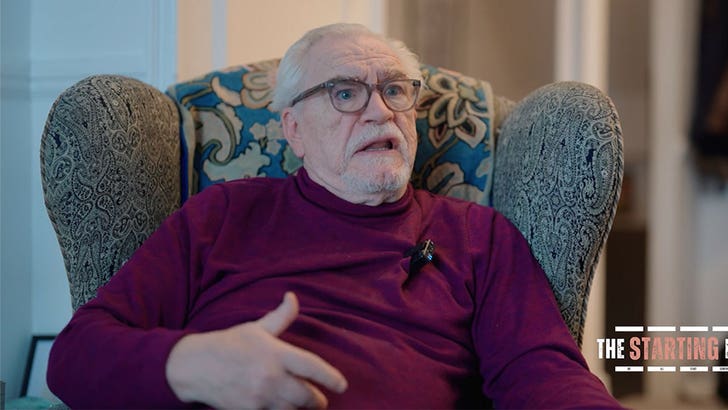
You can check out the full video to see his whole thought process — but this clip here gets the job done … with Brian explaining why society needs to move more toward a matriarchy.
He says the reason humans are so damn resistant to that, though, is because of the Bible — and all the stories that go all the way back to Adam and Eve … which he thinks subjugate women to a lesser-than role in society, and which are burned into our subconscious today.
On that front, BC calls the Bible the greatest propaganda instrument of all time — and slams it as the worst book ever. He also says God doesn’t exist … and that religion is simply a means of control.
Safe to say … the homeboy’s an atheist, and he ain’t down with all the praying and proselytizing. Sounds like Brian also thinks humans are being held back by old scribblings.
Get ready for the backlash … the holy ones ain’t gonna be happy about this.
-

 World1 week ago
World1 week agoShipping firms plead for UN help amid escalating Middle East conflict
-

 Politics1 week ago
Politics1 week agoICE chief says this foreign adversary isn’t taking back its illegal immigrants
-

 Politics1 week ago
Politics1 week ago'Nothing more backwards' than US funding Ukraine border security but not our own, conservatives say
-

 News1 week ago
News1 week agoThe San Francisco Zoo will receive a pair of pandas from China
-
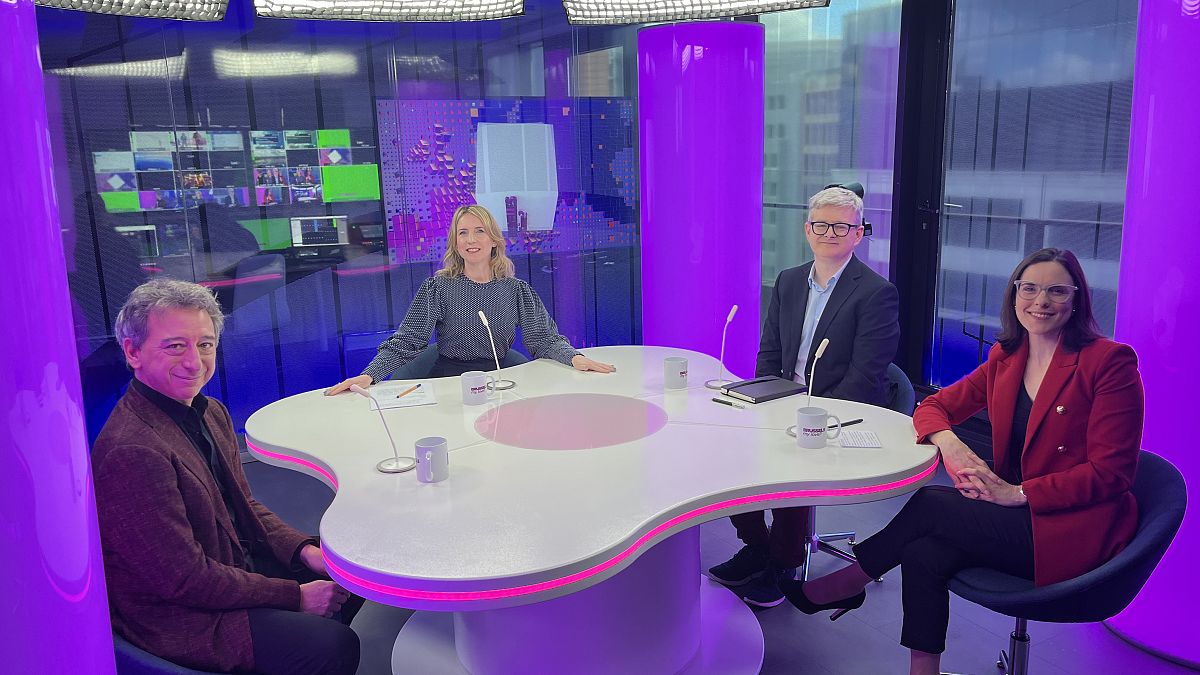
 World1 week ago
World1 week agoBrussels, my love? The EU single market is not sexy enough for voters
-

 World1 week ago
World1 week agoEU sanctions extremist Israeli settlers over violence in the West Bank
-

 Education1 week ago
Education1 week agoVideo: Dozens of Yale Students Arrested as Campus Protests Spread
-

 Politics1 week ago
Politics1 week agoDemocrats hold major 2024 advantage as House Republicans face further chaos, division
